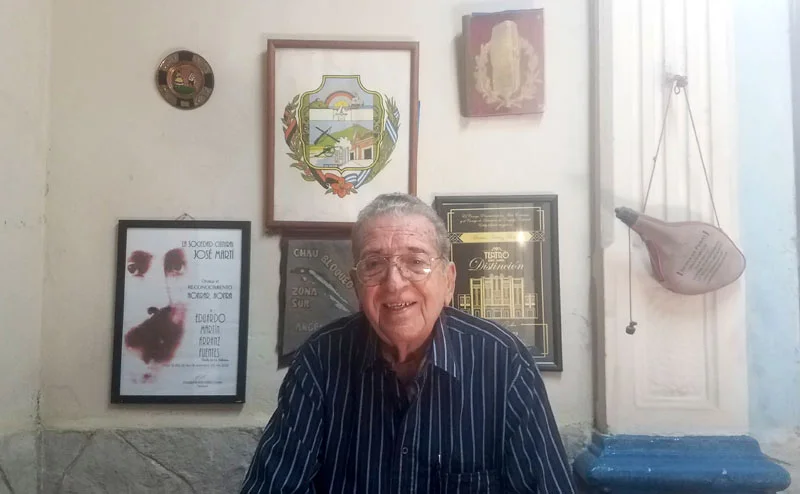With incredible lucidity and vitality at 86 years of life, with the elegance of a gentleman of the Spanish zarzuelas, maestro Martín Arranz, one of the founding voices of the Teatro Lírico Rodrigo Prats, 61 years after that cultural event, agreed to an exclusive dialogue for Radio Angulo digital from the colonial mansion, last dwelling of the great poetess Lalita Curbelo Barberán.
What has been your literary dream in recent years?
“The work “Apuntes del Teatro en Holguín” written 10 years ago and that will finally see the light on March 21 at the International Book Fair in Holguin …”
What do you tell in that work?
“In the work I address aspects from the 17th century to the present day. Only by reading the book they know it. They tell me that it is going to be a patrimonial work. I am going to leave this for history. They will no longer have to come to me to ask me there is the book “he affirms me and smiles like an English Lord.
Was there theater in Holguín before the Lírico Rodrigo Prats?
“It is a crime to let the past die and based on that and what happened, and although Holguin was not a very outstanding province in opera and zarzuela, there was an attempt of theater in the years 42 and 51 of the last XX century. Even Carlos Manuel de Céspedes and Perucho Figueredo came here to see plays. At that time, before the triumph of the Cuban Revolution, there was no support or concern for lyrical singing on the part of institutions or governments. Everything was on a personal basis of some people interested in culture”.
Which figures do you consider decisive in the genesis of the Theater in Holguin?
“To Silvio Grave de Peralta, after the triumph of the Cuban Revolution, he was the first director of the municipality without him and Raul Camayd, without them, it is not possible to speak of the theater in Holguin, both were the Quixotes that faced the windmills”.
Was there independence in culture and theater in Holguin?
“Holguin depended on Santiago de Cuba, it was the capital of the province. Without them they opposed to that there was Lyric Theater in Holguin. It was achieved with a lot of effort and work. We had to wait until the movie they showed at Teatro Infante (today Comandante Eddy Suñol) was over to rehearse our plays, but we made it.
Los Gavilanes opened the presentations of the Holguin opera. In what context was it premiered?
“On November 16, 1962, in full October Crisis, although I was not present I was mobilized, “Los Gavilanes” was premiered with all the law, a great success, reflected in the front page of the nascent newspaper ¡Ahora! with the headline: “Unprecedented successes in the cultural history of Holguin” and the success of the work had a great national echo. The lyrical theater of Holguin has a national and international prestige”.
What does the presence of the Rodrigo Prats Lyric Theater in Havana remind you of?
“It occurred to us to mount and bring to the National Theater “La Viuda Alegre” and it was said by some: “how the guajiros of Holguin were going to act in costume with that play.”
“Newspapers Granma, Juventud Rebelde highlighted it. Bohemia Magazine wrote two weeks about the presentation. They echoed our presentation. The public said: ‘that’s a real lyric theater’ and we felt sorry for them, because members of the Havana lyric theater were there”.
The Company was in several countries, among them Peru, how was your first international tour, how do you remember that moment?
“In those days in Peru, in 1986, we had the first work that was for the bourgeoisie of that country. I remember the person who hired us in his saying: “With Cuba we are divided by ideological issues, but from Cuba we have much to learn from that archipelago. And it is a company from Holguín, not from the capital. And here there are eight million inhabitants in Lima and we don’t have a Lyric Theater”, he says excitedly.
Personally, at what age did you feel attracted to art, to acting?
“My interest in research comes from childhood and I had the opportunity to talk a lot with “the viceroy” was an old man mambi, who was arrested by the Spaniards. He would meet with people he was interested in talking about history. I was very interested in art history. When I was nine years old I wore mustaches and did plays, my mother always supported me”.
It is said that you are a master of the Lyric Theater, do you see yourself that way?
“A master without a classroom. I still have a lot to learn”. And the baritone from Holguín smiles with that nobility and naturalness that distinguish him as a sort of Cuban sage of bell canto.
Arranz is an artist, announcer, radio writer with a passion for Argentine tangos and Carlos Gardel in the ether of Radio Angulo.
- Martín Arranz, the great maestro without a classroom - 12 de March de 2024
- Daniel: Concert with National Symphony Orchestra, my prize - 27 de February de 2024
- ArCAI to open a store at Casa Marco in Holguin - 19 de February de 2024

